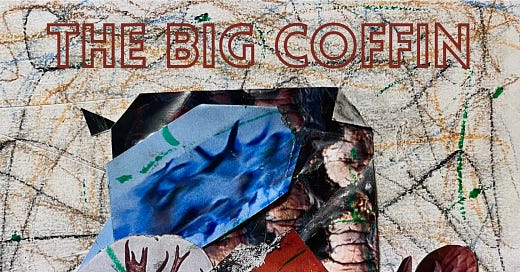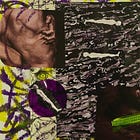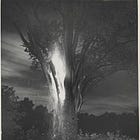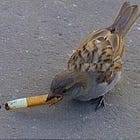For the first time in days, she found high ground from which she could watch the relentless trudging of the stoic beasts. Prior to this she’d endured miles and unrelenting miles of flat tundra, sparse trees as taunts toward the unimpeachable sky, sleeping under shallow rocky overhangs and keeping herself quiet, without smell–neutral deodorant.
That morning, the cacophony of heavy tracks which made natural ugliness of the gentle snowscape veered slightly west after months of northly migration and her instincts told her to stay straight north. This was no easy task, of course, when those tracks made the only tamped down path through the several inches of cold white stuff (this, thought in the voice of her mother even after all this time) and so the day had been a long labor in which her legs were chilled numb up to her knees and her thighs set burning from the gradually increasing angle of incline. This contradiction of ice and fire was good labor.
And it had been worth it–the incline led her onto the round rim of a wide valley which dipped as she rose so that by late afternoon she had a perfect vantage point from a scraggly stand of conifers before the low vista where the caribou had stopped to drink water from a stiff pond and sniff for lichen at the sides of the valley where the wind’s direction had spared a tidy span of rock from a coating of snow.
It was the first time in nearly a week that she’d found a spot which allowed for such easy observation. She crouched beneath a short tree and took a notepad and pen from her pack. With difficulty she handled the pen through her thick gloves, the instrument eclipsed by black sausage fingers, and made quick tallies of the brown smudges down in the valley. They totaled at sixty-three, two less than her last survey, which followed. She’d encountered each body left behind where it had collapsed in the snow, still warm, sagging against the tracks of her family. A few dozen had died since she started tracking them at the end of the summer, when they began their migration from the calving grounds in the boreal forests to here, the tundra where they’d spend the rest of the winter. By her tally, that was three dead per week on average, each fallen to malnutrition rather than predator.
Still, they marched on, following the gift of nature’s internal compass on paths trodden by thousands of muscled beasts before them. They never grew desperate. They never cried out for a god to strike them dead so that they might be released from their pain. They put hoof in front of hoof and walked on until they could walk no longer.
She had night terrors when she was younger. Awful, spasmodic fits in which she dreamt of a world that looked a lot like this one. Bleak, barren, cauterized and cold. Plains of windswept snow creaking and groaning like a sagging, splintered barn. Not so much void of life, but indifferent to her own life–she could live or die, the world would eat her up either way.
She’d wake shivering and gasping, breath stuttering in her lungs as though a monolithic glacier sat squarely on her chest. Inevitably, the gasping would make way to salty, bitter tears, then violent sobs and her mother would sweep through the door to take her in her wide, warm arms smelling of sleep and rosewater.
Her mother would press her lips to the damp of her daughter’s forehead and sing to her, a lullaby or a poem or a dirge. It went:
Come darling, To the tip of the sky The world is not yours This breath is not mine I give it to you Gathered as bouquet Held forever to your chest At the end of all days
She’d never been sure if it was real or if came solely from her mother’s mind and nowhere else–that made it real, did it not? The song itself never did quite calm her but gave her reason enough to calm herself, for the love of her mother. And her mother understood this unspoken deal, as mothers do. There is only so much a single person can do but love for the sake of another.
She was feeling a bit of the caribou’s malnutrition herself though not due to a lack of food. The MREs stacked inside the pack which she tugged on her crude sled were plentiful and she would not run out for another month or so, by which point the thawing of spring would begin and she might make a return to the city to stock up. Her appetite for these meals, however, was consistently waning and as the days went on she found herself less inclined to eat three times a day, usually just when she woke and before she slept, sometimes just once in the morning. Maybe it was prostration, perhaps nothing more than wanting to share in the plight of the gentle animals she could not join.
As the sun, a thin disc behind the gray cloud cover, arced across the sky following its eternal rhythm, she watched the caribou sniff and forage for food they would not find and forced the dry block of an MRE down her own throat.
Their bodies were lean and beautiful. Muscles shifting and twitching beneath skin tawny and brown like the rough bark on trees. Heads barren and soft, their stately antlers abandoned months prior after the mating season concluded. The skittish young calves hugged their mothers’ legs with their fragile rumps or otherwise romped about with one another in the snow. Polite tails twitching, big, wet eyes blinking. They did notice her occasionally but paid no mind unless she moved too suddenly. They were not easily spooked creatures.
In the afternoon, they began to filter out, barely sated but admirably persistent. Once the last of the herd had stumbled from her view, she slid carefully down the incline to the foot of the valley. Here she crouched at the sturdy bases of the trees to observe them where they were scarred and blackened. The fires that had swept through here in the summer had burned up the precious lichen as well. This scarring was everywhere beneath the white crust of tundra. Fire killing even in the winter.
Some of the trees bore, too, the old scars of fresh antlers scraping their bark as the herd returned south in the spring. A reminder that they had been here before and would return again until they no longer could. Even now, after months of this tracking, and a long career of studying their ecology, she found tears crystallizing in the cold around her eyelids, precious diamonds adhering to her lashes. The mourning is constant enough to be completely dull.
Her father was a carpenter. The bedroom she’d spent the first seventeen years of her life in was positively littered with the little wooden toys he’d craft for her–horses, sparrows, toothy beavers and bushy-tailed squirrels—caribou (Santa’s reindeer, he’d tell her). She never treated them as toys, though. They were precious to her, breathing pieces of art with real souls held in their sturdy frames.
Her father was a gentle man, kind and tender if prone to bouts of reclusion and isolation. But when this sadness came over him, he’d retreat to his shed tucked into the treeline and by the time he emerged with these tiny sculptures for her, the sadness had been shed and he would kiss her on the forehead as he placed the living things in her small hands and she knew she was lucky.
When she was eight years old, her mother told her she would soon have a brother. The idea of a little squirming thing to care for excited her. Like one of her wooden friends but this one would grow and still be just as precious. She doted on her mother for those months as her feet grew tired and her belly swelled. She pressed her lips to the taut skin and hummed to him so he might know her already when he arrived.
What her mother eventually delivered could not breathe, was stiff and still, and in the end so like her wooden trinkets anyhow. Her father built a tiny coffin for it and then he built nothing more. This sadness he would not escape from.
When they buried the stillborn thing in the backyard in its tiny coffin, her mother sang the song of her night terror soothing and she felt some grief then that he’d never truly hear it. Death penetrated, then.
The night terrors had started up again her first week out here. Gone was the bleak and barren wasteland of the tundra and the feeling of desolation it had induced–now that she had lost herself out here, it hardly frightened her anymore. It had been replaced instead by its polar opposite, the crowded city. Narrow alleys, sidewalk sludge, an endless crowd eternally shouldering her aside to get where they so importantly needed to be. The city itself was indeterminate, the usual concrete and brick, hard class lines drawn with main streets doubling as shopping centers, but she would catch, sometimes, flashes of the city where she’d attended university. The cloying courtyards, the patchwork campus, bright LED screens through dirty windows, darting in front of cars with the sort of youthful abandon only a college kid can muster.
She’d gone there to study biology and then the longer she’d spent in the dirty city with its segmented attempts at nature the more she yearned for the countryside of her dilapidated upbringing, though to go back to that house was out of the question. Two coffins too many waited to greet her return there.
The eventual change from biology to animal studies had been inevitable. Her father’s wooden carvings followed her everywhere, if not physically (she left them behind in the bedroom in which she was raised with the child she was no longer) then spiritually. To know intimately the souls of living things, that calling never let up. Caribou though, their time had come and gone. Whatever conservation efforts were already underway was all that could be done. Her advisor has urged her to study anything else, to focus on something that needed more help but she could not be deterred. The noble beast and its simple needs were the only path she would follow.
In the night terrors though there were no clear paths, no destination, nowhere worth going. Claustrophobic, suffocating, a big oppressive box with no exits. She could push and push against the throngs of faceless people, careless and cruel, but she never got anywhere and felt anyway the panicked urge to push and elbow, just as carelessly, until she got there.
She woke in the frigid pale air of the morning clutching at the glacier on her chest with no mother to kiss her damp forehead and sing to her a reason to be calm. Somewhere off in the misty burgeoning day, a lone caribou called out its mournful groaning dirge.
The summer before when the fires swept from the Northwest Territories all the way to Alberta and Ontario, and farther south in the states too, and across the world on other continents and in places where there was no one to report on such destruction, she thought only of the caribou. She knew, from her time in school, from her own immense and wretched thesis, that wildfires ate up their boreal habitat and scorched the lichen they required to survive the winters right from the earth. Even before the destruction truly settled in, when smoke was still spilling into the sky, she knew she’d end up out here, futilely, trying to save them with her own two hands if nothing else.
Over the phone, before she left, she urged her mother to flee but her argument was half-hearted—she’d accepted even before calling that her mother would be staying put. She wouldn’t leave that house, there was no use in leaving. She’d die in the place where her husband had died, too. She mourned, of course, for her mother who had wanted to join her lost love for some time now, a spiritual absence that had made it all the easier not to return home. Guiltily, she mourned more for her wooden toys which would burn up with all the rest. The souls of living things crushed to pointless cinders. She packed a bag that night and left yet another version of herself behind. There was only the lost, wandering creature now, following something else’s migratory pattern for lack of her own. The one who set out to save things that cannot be saved.
In the evening of the next day she came upon a weak calf left behind in the snow, still breathing in exasperated puffs, steam rising from its wide nostrils. Until then, every caribou she’d come across had died simply, without struggle. This child fought its fate.
She kneeled beside it where its wild black eyes found her in fear, yet it was too tired to struggle away. Though still a calf it was nearly as big as her, panting and shaking against its meager, still new frame. She’d watched from afar the calving grounds where he’d been born. Fresh thing in late autumn, he would only ever know winter. The spring was just a dream to be had when he closed his eyes. Her hand shook as she placed it on the calf’s side where its skin stretched across its thick ribs. Again, he twitched but could not resist. His front legs were crossed, one over the other like a perfect gentleman. His life was short and difficult.
She stayed until he calmed and finally he turned his eyes on her without fear but a childish acceptance. Knowing without understanding. And when she sensed his soul departing his wooden frame, she sang her mother’s song, the lullaby dirge, Come darling, at the end of days, and she got through it without choking on her tears. She regretted that she could not give him more than this, though what more could he have asked for? All the beautiful world was his coffin.
When he stilled, she stood and looked to the sky where the near-eternal haze hung over the tundra and everything else like cold breath. A few meager scraps of evening sunlight pressed through the dome of gray like thin fingers cracking an egg. Grief crackled in her bones. She wandered aimlessly, carelessly, looking for somewhere to sleep and ended up at the edge of an overhang where a distant, stout city loomed on the horizon. Yellowknife, she thought, though it hardly mattered. They all looked the same once abandoned.
The distant skyline was silent, far enough to be only an artist’s rendering of bombed out buildings, fragmented concrete like broken nails scratching up the low cover of cloud and smog. She stood and watched the unmoving horizon grow dark in the evening light, could almost imagine that empty city crying. Below, and closer, she could see the caribou marching on, never pausing to mourn the long dead.
Though she’d studied them for years to the point of obsession, she’d never seen one up close until that summer when everything burned and the burns sparked pointless war and she ignored it all to cling to something that made sense. At those calving grounds in the boreal forests where thousands of caribou birthed generation after generation of stoic travelers, she’d looked on as the bulls locked antlers and the females observed, blinkingly, to determine the worthy. It was simple, instinctual, a natural rhythm. How many of that herd would ever make it back to those calving grounds in the summer? Would it matter if she were there to observe it? There was not enough that her two hands could do. No silly tracking and tallying would stop the inevitable. Nature could make no use of her living flesh.
She was so weary. She could not imagine how anything might persist in this empty, torn up world. To simply step from this overhang and let the cold earth swallow her up would be an easy mercy, to die by her own hand like her father and or by inaction like her mother would be an awful closeness. In the end, though, she merely sat down hard in the snow and watched the caribou trudge with purpose into the night. Imagined what might return if—when—the world thawed.
In the spring, she thought, green will come again. Life will make its false starts again. Antlers grown, antlers shed, children born, children dead.
She saw in her lifetime the fiery fall of every empire. She saw the caribou march on.









I was thinking for a second she might try and like save the caribou baby, but honestly I fucking Loved how it went and how it ended. Like, no purpose except the carrying on of things. Beautiful in its cruel simplicity. Cruel in its neverending beauty.
Im not often moved to tears by anything but this prayer for a dying world and the beauty of nature really brought that throat gripping sorrow right up to the back of my eyes and a single tear escaped depsite my best efforts.
it feels like you wrote it all in one go because there are some places where the emotional flow is stronger than a disciplined and more careful wordsmithery might have carved some more deternined tautness or imagery into it, or avoided repetition, for example.
but this is not criticism just observation of the feel and flow... the result is truly moving and i just love this poem to the caribou.
(as an aside I actually used the word rangifer myself quite recently which gave me a little frisson)